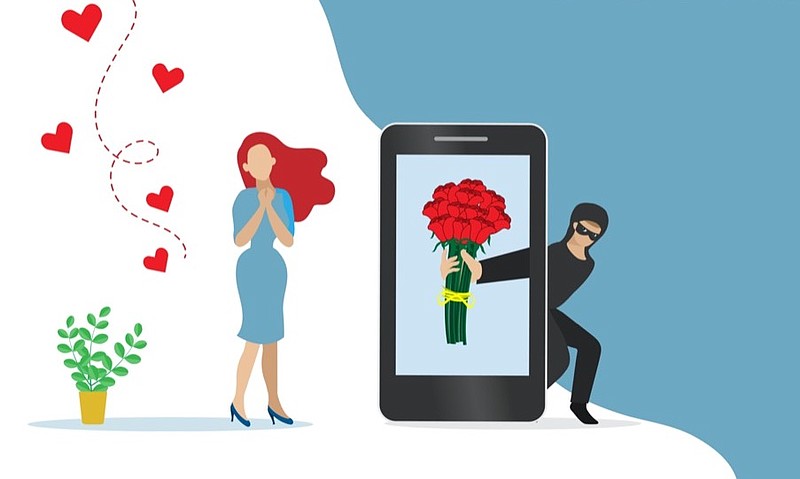Valentine's Day may have just passed, but romance scams are something that could hurt your heart and your wallet at any time of year. In fact, the Federal Trade Commission (FTC) just issued a warning that romance scam losses spiked by 80% in 2021 to $547 million, with the median consumer loss being $2,400.
During COVID more people have turned to online dating sites and social media to meet others. Unfortunately, while these platforms may have made it easier than ever to meet new people and find dates, they've also made it easier to be scammed. Con artists create compelling backstories, and full-fledged identities, then trick you into falling for someone who doesn't exist. This form of deception is known as "catfishing." Better Business Bureau's (BBB) has witnessed a growth in romance scams in recent years.
BBBs across North America received 276 reports on romance scams in 2021 and the numbers in early 2022 have already doubled those reported in the same period in 2021. Victims report that they were befriended and tricked into relationships with fraudsters whose sole aim was to get money and/ or credit card information from them.
With the pandemic still a part of our lives, BBB encourages those looking for love to be wary of fraudsters. Don't let your quest for love blind you to the realities of romance scams. Online dating sites are popular, as many singles use technology to find a match. But behind many dating profiles lurk scammers who are ready to dupe users into believing they have found love.
If you see a family member or friend falling for what you believe is a romance scam, now is the time to share these warnings. These scammers can disappear as quickly as they appeared.
How the scam works
Most romance scams start with fake profiles on online dating sites created by stealing photos and text from real accounts or elsewhere. Scammers often claim to be in the military or working overseas to explain why they can't meet you in person. Over a short period of time, the scammer builds a fake relationship with you, exchanging photos and romantic messages, even talking on the phone or through a webcam.
Just when the relationship seems to be getting serious, your new sweetheart has a health issue or family emergency, or wants to plan a visit. No matter the story, the request is the same: they need money. But after you send money, there's another request, and then another. Or the scammer stops communicating altogether.
Tips to spot this scam:
- Too good to be true. Scammers offer up good-looking photos and tales of financial success. Be honest with yourself about who would be genuinely interested. If they seem "too perfect," your alarm bells should ring.
- In a hurry to get off the site. Catfishers will try very quickly to get you to move to communicate through email, messenger, or phone.
- Moving fast. A catfisher will begin speaking of a future together and tell you they love you quickly. They often say they've never felt this way before.
- Talk about trust. Catfishers will start manipulating you with talk about trust and how important it is. This will often be a first step to asking you for money.
- Don't want to meet. Be wary of someone who always has an excuse to postpone meeting because they say they are traveling or live overseas or are in the military.
- Suspect language. If the person you are communicating with claims to be from your hometown but has poor spelling or grammar, uses overly flowery language, or uses phrases that don't make sense, that's a red flag.
- Hard luck stories. Before moving on to asking you for money, the scammer may hint at financial troubles like heat being cut off or a stolen car or a sick relative, or they may share a sad story from their past (death of parents or spouse, etc.).
Protect yourself from this scam
Never send money or personal information that can be used for identity theft to someone you've never met in person. Never give someone your credit card information to book a ticket to visit you. Cut off contact if someone starts asking you for information like credit card, bank, or government ID numbers.
Ask specific questions about details given in a profile. A scammer may stumble over remembering details or making a story fit.
Do your research. Many scammers steal photos from the web to use in their profiles. You can do a reverse image lookup using a website like tineye.com or images.google.com to see if the photos on a profile are stolen from somewhere else. You can also search online for a profile name, email, or phone number to see what adds up and what doesn't.
BBB offers more tips on different types of romance scams at bbb.org/romance. To report a scam, please visit bbb.org/scamtracker.
Michele Mason is president of the Better Business Bureau of Southeast Tennessee and Northwest Georgia
